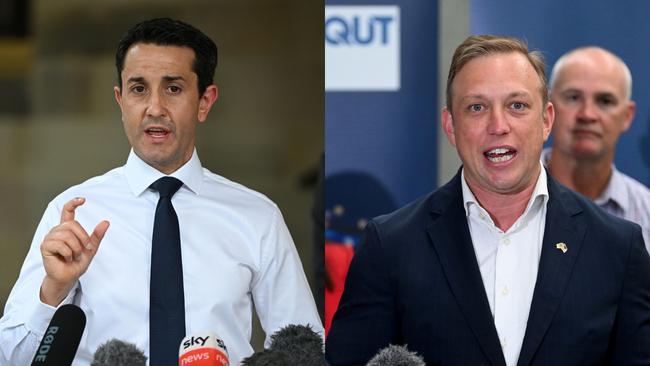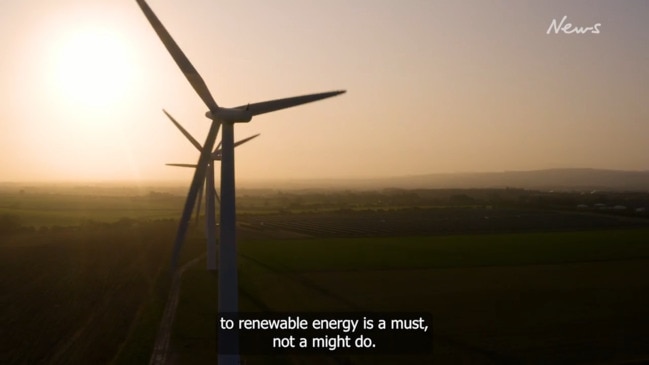Queensland LNP refuses to back mega renewable project until costings released
David Crisafulli says he won’t back the project, which is critical to the state meeting its renewable and emission reduction targets, because it had not been properly costed.

Queensland’s Liberal National Party leader David Crisafulli has refused to back a proposed pumped-hydro project critical to the state meeting its renewable and emission reduction targets, insisting he would not commit to a project that had not been properly costed.
In their first debate, ahead of two by-elections on Saturday and the statewide October poll, Mr Crisafulli and Premier Steven Miles clashed over plans to drive down electricity prices and Queensland’s transition away from coal-fired power.
Mr Miles’ government is relying on the proposed Pioneer-Burdekin Pumped Hydro project to enable it to shut down the state’s five coal-fired power stations, reach its target of 80 per cent renewable energy and slash emissions by 75 per cent in the next decade.
The project, slated to be built near Mackay, is still being subjected to financial, engineering and environmental investigations and is yet to get government approvals or substantive funding.
Initial estimates put the project at $12bn but Mr Miles’ has flagged that figure would likely balloon and more detailed financial modelling may not be released until after the October election.
During Tuesday’s debate, hosted by The Courier Mail and Queensland Council of Social Service, Mr Miles repeatedly challenged Mr Crisafulli to say whether he would support the project, or cut it, if the LNP won government.
Mr Crisafulli responded: “What’s the cost and what’s the impact on power prices?”
“We can’t keep accepting that major infrastructure projects can increase north of 100 per cent without any accountability,” he said.
“If you go to build those projects, they have to be disciplined and built on time and on budget, because otherwise there is only one source who pays for it and that is Queenslanders.”

Mr Miles said two planned pumped hydro projects were critical to deliver renewable energy to drive power prices down.
“We are absolutely committed to them,” he said.
“If you won’t pay what it costs, then you cut it.”
The LNP has matched Labor’s pledge of net-zero emissions in Queensland by 2050, but is yet to detail how it would achieve the target.
Mr Crisafulli has not committed to backing the state’s renewable energy target of 80 per cent by 2035.
During the debate, Mr Crisafulli focused his attack on failures at the government-run Callide power station and Labor’s failure to manage housing crisis after nine years in power.
He announced an LNP government would fund rebates up to $3500 for solar panels on rental properties.
The Labor government ran a similar year-long trial in 2019, but Mr Crisafulli has pledged a four-year program “focused on making sure there is a partnership between the landlord and the tenant”.
Mr Miles’ spruiked the government’s $550 energy rebates for every Queensland household – bankrolled by a huge coal royalty windfall – but would not commit to progressing the subsidy past the June budget.
He did promise to deliver “the biggest cost of living budget ever”.
Mr Crisafulli said rebates would continue under an LNP government “because people are at breaking point”.
“It’s one thing to give a subsidy, that has to happen because the prices have risen here three times the national average.
“In the last 12 months in Western Australia power prices have gone backwards, here they have gone up by 19.9 per cent, so the subsidy just keeps people’s head above water.”
The latest UComms poll had Labor and the Liberal National Party tied with a 50-50 share of the statewide two-party-preferred vote for the first time since December 2022.
Taxpayer-funded track polling, released last month, revealed cost of living was the main issue for voters, with just 12 per cent satisfied with the government’s performance tackling the problem.
Mr Crisafulli’s opposition must win an extra 13 seats in the 93-electorate parliament to secure majority government at the October state election.








To join the conversation, please log in. Don't have an account? Register
Join the conversation, you are commenting as Logout